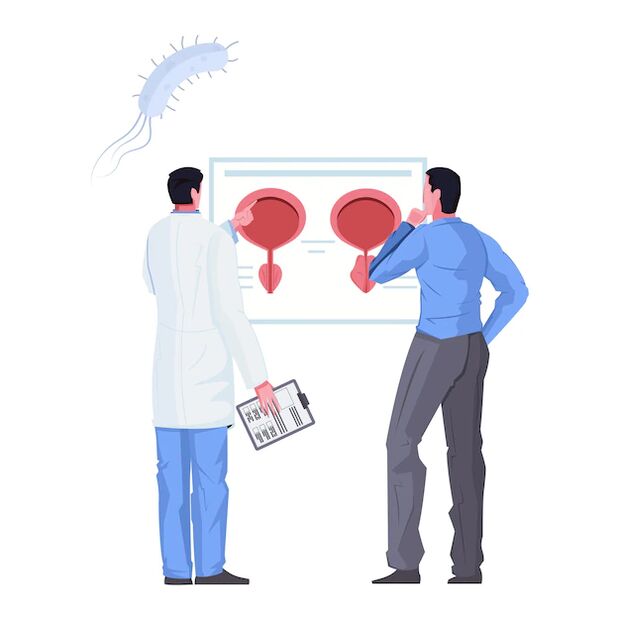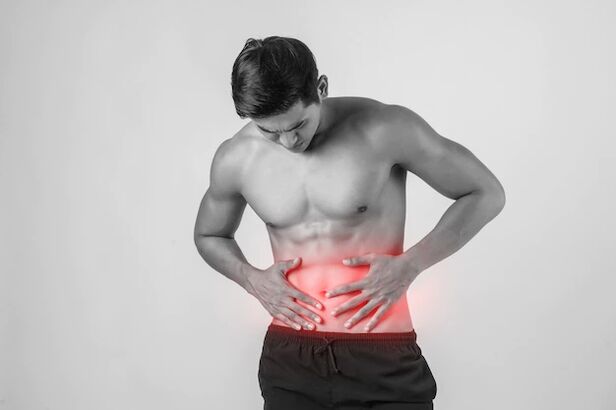
Causes of cystitis
Urinary tract problems can cause urine retention in the body (the urethra is too narrow). Prostatic adenoma. Diverticulosis. Infectious diseases spread through intimate relationships. These include gonorrhea and chlamydia. Prostatitis, urethral inflammation, seminal vesiculitis. The listed diseases can lead to pathological changes in bladder function. Presence of mechanical barriers (especially stone formation). Recent urological surgery. Malignant tumors of the urethra or prostate. The infection is limited to the upper respiratory tract. If a patient has ARVI or tonsillitis, bacteria may enter the genitourinary organs through the systemic bloodstream. Therefore, cystitis can be the result of any infection (regardless of its location).

prostate; testis; kidney
Symptoms of cystitis in men
non-infectious; Contagious.
rise.In this case, the infection penetrates into the bladder from the external environment. decline.The infection enters the bladder from other organs, especially the kidneys. Lymphogenicity.In this case, infection of the bladder via lymphatic vessels is observed. Hematogenous.If there is a foci of pus in the body, the infection may spread from the problem area through the bloodstream. Then enters the bladder.
Allergic reactions lead to inflammatory processes in the bladder mucosa; Deterioration of neurological or immune system function; Chemical burns – due to medical staff error, a patient may receive the wrong medication as prescribed; Attend radiation therapy sessions that involve exposure to the pubic area.
Diagnosis of disease
Urogenital smear.This procedure is designed to diagnose hidden infections that are spread through sexual intercourse. Bacterial culture.This analysis is needed to identify the type of pathogen and determine its susceptibility to certain drugs. A general urine test is performed.In the presence of inflammation, increased levels of red and white blood cells will be detected. An acidic urine reaction indicates the presence of tuberculosis infection in the body. Have a cystoscopy.Informative diagnostic procedures can only be performed if there is no acute phase of the disease. During a cystoscopy, stones, tumors, and other foreign bodies can be found. If necessary, biological material is collected for further diagnostic procedures.
Basic recommendations for treating cystitis
Maintain bed rest.When the temperature rises, antipyretic drugs are needed. You also need to remember correct drinking habits. In addition, patients should temporarily exclude sour and smoked foods from their diet and adhere to strict dietary habits. Minimal spices and seasonings should be used when preparing food. Use herbs.Doctors often prescribe herbal teas, which have antibacterial and diuretic properties. Such products contain natural ingredients (horsetail, bearberry). To reduce severe inflammatory processes, herbal-based preparations are used. To boost your immune system, drink juice made from cranberries. When using herbs, it is impossible to achieve quick results. Such products require long-term use. Herbs are not considered essential. They are used only as part of a complex treatment for cystitis. Perform PCR diagnosis.Testing for sexually transmitted viruses is needed. Treatment options are chosen by the doctor (taking into account the type of pathogen). Drugs with analgesic properties.To eliminate pain, it is recommended to take antispasmodics. In some cases, NSAIDs may be prescribed. Take drugs with significant antibacterial effects.Such drugs are prescribed after determining the susceptibility of the pathogen to the prescribed drug. In the treatment of cystitis, cephalosporins and fluoroquinolones are actively used. Such medications should only be used after consulting a doctor. However, its use should not exceed 1 week.
Help relieve acute cystitis attacks
existing risk factors
Irregular bladder emptying; Vitamin deficiency; maintain a sedentary lifestyle; unprotected sexual intercourse; Frequently changing sexual partners; chronic overexertion; Presence of a foreign body in the bladder area; wearing uncomfortable underwear; The presence of chronic diseases of male reproductive organs; decrease in immunity.
complications of disease
Changes in bladder structure.Against the background of epithelial degeneration, the organ gradually loses its elasticity and significantly shrinks in size. One consequence of cystitis is the loss of tissue regeneration. This may cause the bladder to rupture. Kidney damage.The most common complication of untreated cystitis is pyelonephritis. A more serious consequence is the development of kidney failure. This occurs against the background of severe poisoning of kidney tissue by the waste products of pathogenic microorganisms. The bladder sphincter weakens, causing urinary incontinence.This complication is most commonly diagnosed in older patients. Depression in the context of illness becoming chronic.Cystitis may recur several times a month. At this time, the man became a "toilet hostage" and his mental state deteriorated significantly.
notes!Without appropriate treatment, the risk of the disease becoming chronic is quite high. In this case, damage to the bladder and other organs of the genitourinary system can be observed.
How to avoid getting sick?
Clean it at least once a day. In this case, it is recommended to use a simple baby soap that does not contain dyes or other harmful synthetic ingredients. Prioritize clothing that is appropriate for the weather. In the case of hypothermia, not only cystitis can occur, but more serious lesions can occur, leading to infertility. Washing yourself with soap before and after sexual contact can be beneficial to both parties. Use condoms during intimacy. Pay attention to strengthening your own immunity. This is especially true if representatives of the dominant gender are prone to frequent ARVI infections. If your immune system is compromised, you should consult an immunologist. Do not try to suppress urination. With prolonged urinary retention, a bladder infection may develop rapidly. Change underwear every day. Drink enough fluids. Avoid wearing underwear made of synthetic fibers. After defecation, wash from front to back. Otherwise, bacteria can move from the intestines to the male external genitalia. From there, pathogenic microorganisms can easily penetrate the urethra and then enter the bladder. Follow recommendations for preventing constipation. Do not take medications without a doctor's prescription.
























